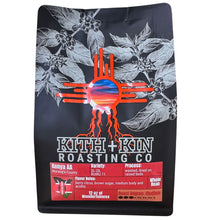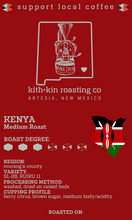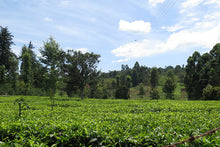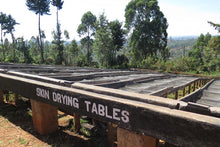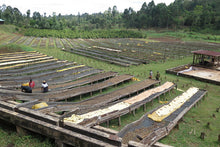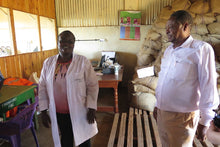
This Kenya roast leans just slightly darker than a true medium (like our Colombian), delivering the rich, smooth flavor many customers expect from high-quality coffee. It offers milk chocolate notes without the bitterness of a dark roast and features very low acidity for an exceptionally smooth cup.
Sourced from cooperatives in central Kenya, these beans are grown in loamy clay soil on the slopes of Mount Kenya and the Aberdare mountain range. Farmers carefully handpick only the ripest cherries, which are pulped, fermented overnight, and dried on raised tables for 8 to 14 days. Instead of discarding waste, cooperatives repurpose pulp as organic fertilizer.
The Impact of NKG Bloom
This coffee is part of NKG Bloom, a program supporting smallholder farmers with:
- Technical training & soil analysis for better yields
- Sustainability & certification support for higher premiums
- Factory improvements like upgraded washing stations
- Access to financing for long-term growth
- Seedlings & diversification crops to enhance food security
- Digital tools for better inventory and farm management
Nicholas Kabare, head of Tropical’s Farmers Services Unit, believes these efforts will boost production by up to 50% in just a few years—a testament to the power of knowledge and sustainable practices.
This Kenya NKG Bloom Nguvu offers more than great coffee—it’s a cup with a purpose.
Region: central Kenya
Processing Method: washed
Drying Method: dried on raised beds
Variety: SL 28, SL 34, Baitan, Ruiru 11
Roast Level: medium
Cupping Profile: notes of berry, citrus, vanilla, brown sugar, and mildly starchy with a medium acidity and body
Important Ordering & Pickup Information
- All customer orders are roasted every Thursday.
- To have your order included in the next roast, please place it by Wednesday morning.
- If you’re purchasing locally, we recommend allowing at least four days after the roast date for the coffee’s flavors to fully develop.
Local Pickup Option
If you're nearby, save on shipping by selecting Pick Up instead of Ship at checkout!
Thank you for your support—we can’t wait for you to enjoy your coffee!






